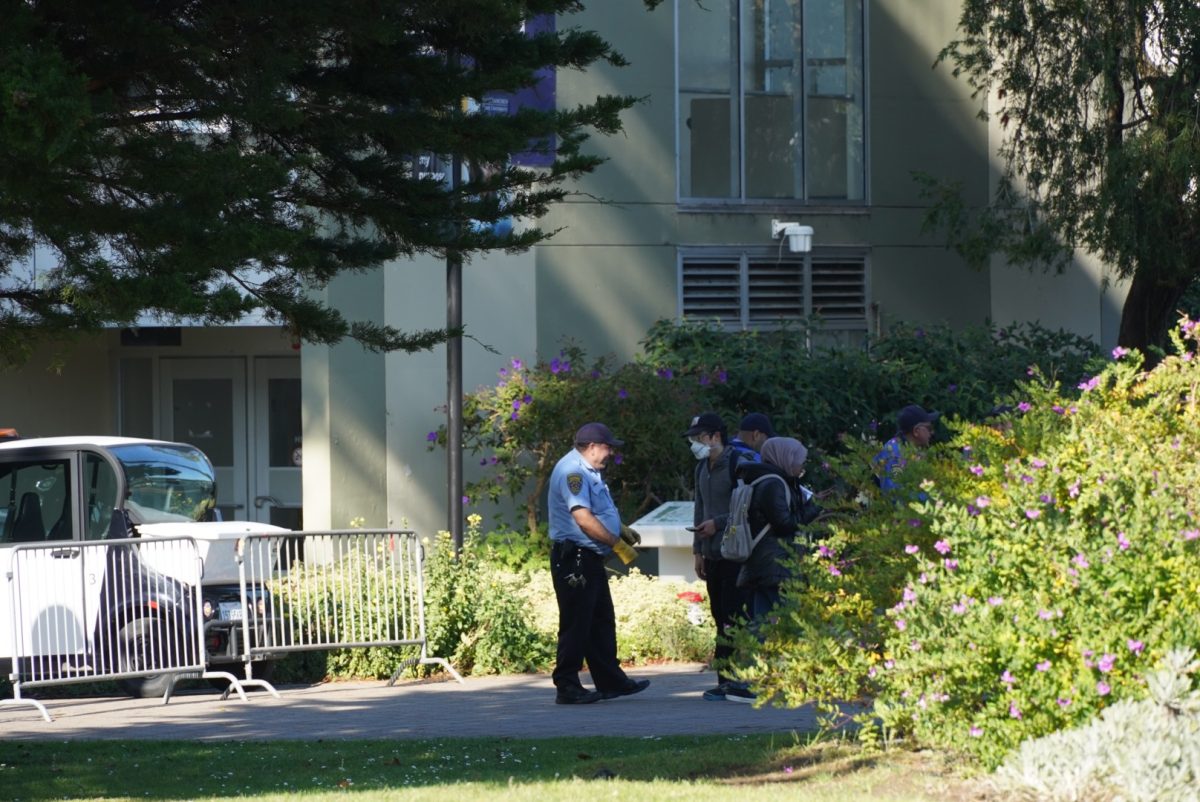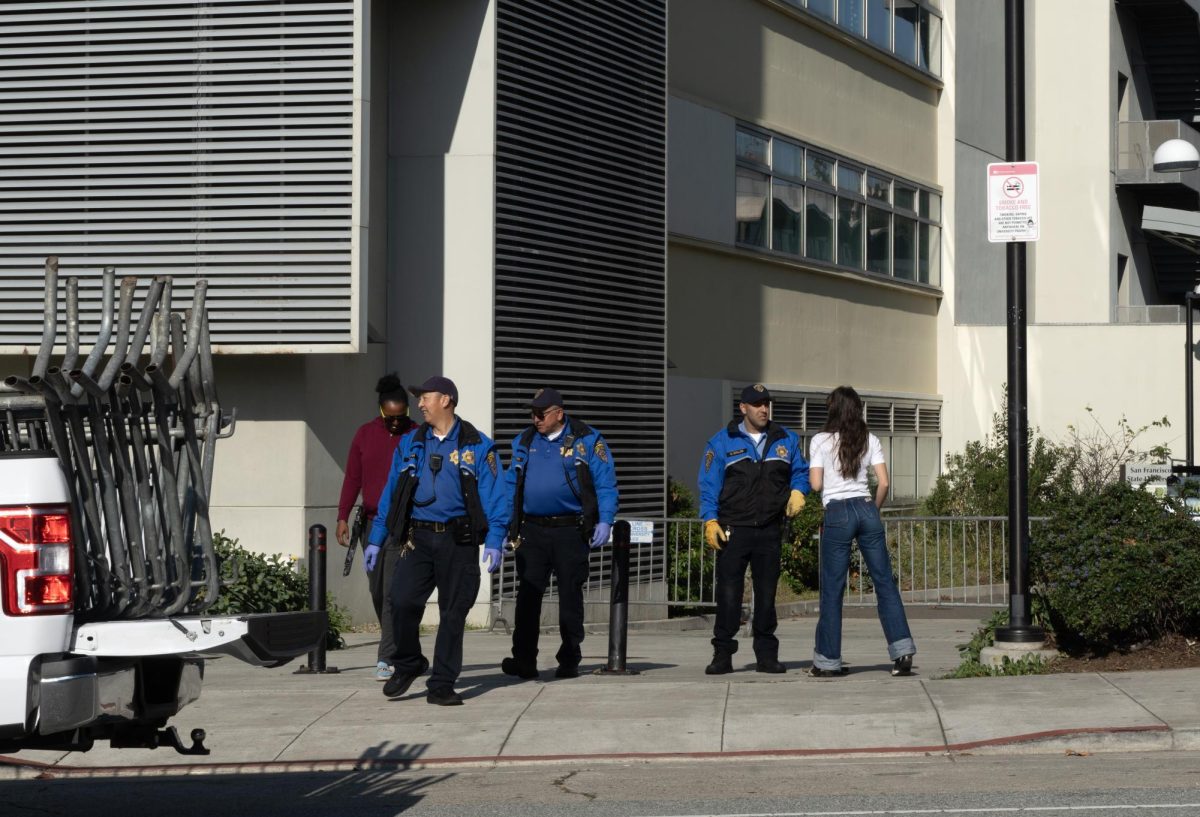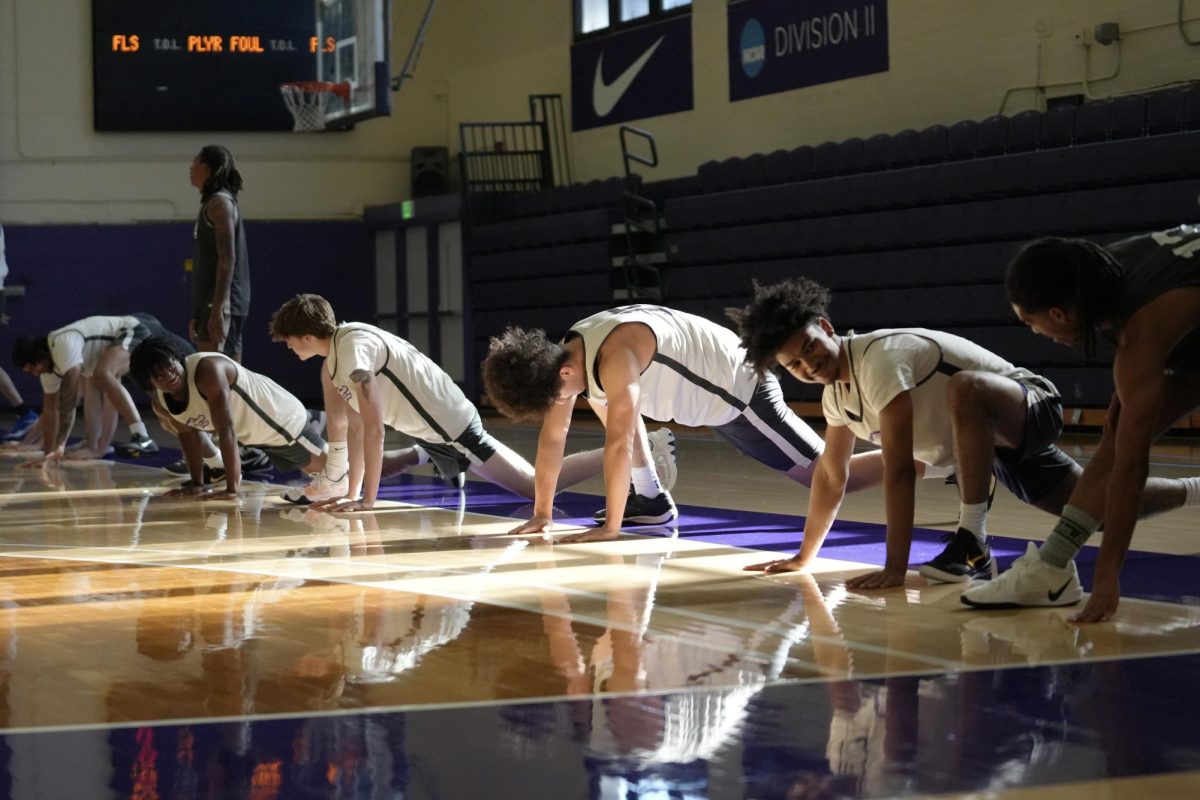Allegations reinforce community divisions
May 18, 2019
Isis Tiana Dorley, an Africana Studies student who filed a Title IX complaint against McDougal on grounds of alleged harrasment, stands for a portrait in the Humanities building on Monday, May 13, 2019. (LOLA CHASE/Golden Gate Xpress)
On Feb. 28, 2019, Isis Tiana Dorley alleged that Dr. Serie McDougal exhibited behavior that fit under Title IX, as reported in Xpress.
An investigation of Dr. McDougal Title IX case concluded November 27, 2019. After conducting interviews, speaking with Dr. McDougal and several witnesses and the investigator came to a conclusion.
An email sent Dec. 10, 2019 from SF State Equity Programs and Compliance provided by Dr. McDougal stated that the investigation found the preponderance of the evidence demonstrated insufficient evidence to show that Title IX was violated.
The allegations stated in the article against Dr. McDougal were unsubstantiated based on the investigation
And after being elected Department Chair in Africana Studies Dr. McDougal, who is currently on leave, was offered the position but declined.
Dr. Serie McDougal was voted the new chair of Africana studies Monday, according to a source within the department, despite an ongoing Title IX investigation into the alleged harassment of a student.
Africana studies major Isis Tiana Dorley, 22, told Xpress her relationship with McDougal, a professor and chair of Africana Studies and former director of the Black Unity Center, (BUC) crossed the line from that of a mentor to an abuser in the last year, prompting her to file a Feb. 28 Title IX complaint against him, despite backlash from people within the department and the Black community on campus.
Dorley said her relationship with McDougal was originally professional, he was her professor, adviser and her supervisor at the BUC.
“It was really a pivotal relationship I feel like I built in college,” she said. “It showed me someone actually valued my opinion about something and there would be actual decisions made based on the things that I thought were important. That was a big thing because no one really listens to you when you’re in college, especially if you’re a Black woman.”
But Dorley said her relationship with McDougal became more personal when she and a classmate, who declined to comment, invited him along on a trip to Ghana last May, a decision Dorley said she now regrets.
According to Dorley, McDougal arranged and paid for expensive tours of the country and she said she was surprised by his generosity and willingness to bend traditional student-teacher relations.
“I now understand that I should have never gone on my vacation trip to Ghana with him,” Dorley said. “It blurred the lines between a student and faculty relationship.”
Broken relationship
Last fall, as McDougal rallied student support for his directorship of the BUC, Dorley began to notice her ideology no longer aligned with McDougal’s and she decided to distance herself. But she said her withdrawal didn’t go unnoticed and McDougal started a persistent campaign to meet privately with her.
“We had one in-person meeting and that was the meeting that I felt everything really shifted,” Dorley said. “I met in his office. He was being aggressive towards me and started talking about the Black Unity Center and I was like, ‘Oh, this is not the person I knew–or thought I knew.’”
McDougal declined to respond specifically to any of Dorley’s allegations, though he denied having an inappropriate relationship with her.
“There are healthy and unhealthy ways of responding to differing views and I am hoping more productive approaches prevail,” McDougal said in an email to Xpress. “I am sad that a situation like this has come about. I believe people who know me, know that I have spent my career being supportive of my students as best I could. I have never been hostile or aggressive toward them.”
Psychology major Ola Elatta became close friends with Dorley in 2017 after spending time in the BUC and on the board of the Black Student Union where Elatta serves as treasurer.
“When I met Isis, her and McDougal seemed very close,” Elatta said. “They both worked in the BUC, would talk often and attend meetings together. She always spoke very highly of him because that was someone that she trusted.”
But Elatta said she witnessed the unraveling of their relationship in the fall of 2018.
“She started showing me all the texts that she was getting from him,” Elatta said. “Like, we’d be together and he’d be like blowing up her phone.”
Screenshots of text messages provided to Xpress by Dorley show on Oct. 2, Dorley asked McDougal for personal space.
“Even after I told him to stop talking to me, he was still texting me and talking to me,” Dorley said. “I know how much weight he holds [in the University] and how much people respect him and how people see him. I felt very isolated, like I couldn’t end that relationship the way that I wanted to, without there being some backlash.”
But screenshots Xpress obtained from McDougal show other exchanges in which Dorley asks McDougal for a personal reference, asks after his mother and wishes him a happy 39th birthday. Dorley, who will graduate in a few weeks, said, however, she felt she needed to maintain the relationship whether she wanted to or not at the time.
“Where I was educationally, where I was in my life, I didn’t have space to handle that backlash and be okay,” she added. “So I just continued to act like I was okay, having this relationship. Meanwhile, behind the scenes, I’m telling people ‘I don’t feel comfortable with this, man. I don’t really want to talk to him.’”
Dorley said she also had concerns for her safety based on her interactions with him.
“I just thought he would retaliate in a very physically violent way because of how angry he got,” she said. “I’ve dealt with things like that in the past with like people switching up on me and like acting crazy and especially when power dynamics–when they have a certain leverage of power and privilege over you. I just didn’t want to put myself in a situation where I could be taken advantage of from something physically violent happening to me because he is trained in martial arts.”
Uncomfortable flight accommodations
Things came to a head in their relationship Feb. 8, according to Dorley, when she and a handful of other students met with McDougal to discuss a research project called the Black Campus Pulse Study in preparation for a conference in New Orleans. According to Dorley, at that meeting McDougal decided to buy the group plane tickets out of his own pocket for the conference on the spot. Dorley said he expressed urgency because he was concerned the ticket prices would continue to rise.
At the conclusion of the meeting, after Dorley had already ordered an Uber to leave, she said McDougal confronted her to discuss their estranged relationship. He told her to cancel the ride and offered to pay her the $5 Uber cancellation fee if she would stay.
When she agreed to stay and talk, she said McDougal insisted they have a conversation apart from the group, to which she said she was too nervous to dispute.
“He was like, ‘I know you can read people. Look into my eyes and you can see that I would never hurt you.’” Dorley recalled. “And I was just like, ‘This is so fucking weird.’ And then he was like, ‘Don’t tell anyone about this conversation because there’s certain people that want to take me down.’”
She said he told her she could call him any time–day or night–but his level of familiarity coupled with his insistence upon secrecy made her uncomfortable. According to Dorley, McDougal gave her the option to either confront their differences or abstain from accompanying the group on their trip to New Orleans.
She said she viewed his gift of the plane tickets as a form of bribery aimed at gaining her implicit approval. If she took the tickets, she was, in a way, signaling she was ok with him, so she said she immediately booked separate accommodations.
But another student in the group, who wished to remain anonymous, told Xpress the travel accommodations McDougal made didn’t fit everyone’s schedule, and ultimately none of them ended up using those tickets.
“There was never any retaliation, the original dates and time of the tickets that had been bought would not work for everyone,” they said. “We were all aware that was the reason.”
This interaction stuck with Dorley, though, and later that month she scheduled an appointment with interim-chair of Africana studies Catriona Esquibel to report what she perceived as harassment from McDougal.
But on Feb. 28 when Dorley and her friend and colleague from the BUC, Ola Elatta, met with Esquibel to address Dorley’s concerns, she said she received a less-than-supportive response from McDougal’s superior.
“[Esquibel] told me to think about the future of the department. She never mentioned a Title IX [complaint], she was just trying to keep it very light, and in-house,” Dorley said. “She was just like, ‘I don’t know if we have to take it there.’ She was just very touchy around it like trying to dissuade me from [filing a Title IX complaint].”
Dorley said Esquibel instead offered to facilitate a mediation with McDougal, something she was not interested in pursuing. A week after their original meeting, on March 7, Dorley had not yet heard back from Esquibel so she sent her a follow-up email to find out the status of her complaint.
“It made me feel like she doesn’t care about Black students, nor does she care about getting justice,” Dorley said. “I felt like she made me question myself. Is what I’m doing the right thing? I knew it was [the right thing], but I feel like that’s what she wanted me to do.”
Esquibel did not respond to requests for comment from Xpress on her interactions with Dorley.
Emails obtained by Xpress indicate that Assistant Manager of Equity Programs and Compliance Sara Lewis contacted Dorley on April 19–nearly two months after she first sought to file her Title IX complaint with Esquibel–on behalf of the Title IX office to schedule an initial appointment to begin the investigation process.
Dorley said she finally had her first meeting with Lewis to discuss the chronology of her complaint Thursday when Lewis assured her that an investigation into McDougal’s alleged violation of Title IX’s mandate against retaliation, among other things, would be going forward.
Backlash
Rumors about the breakdown in the relationship between Dorley and McDougal and the Title IX complaint percolated under the surface within the Africana studies department for months.
Flyers were plastered across campus May 10 condemning the Africana studies department’s decision to consider McDougal as a candidate for the position of department chair. The flyers were attributed to “Concerned Black Students.”
“There is about to be a colossal mistake made on Monday if Dr. McDougal is elected chair of the Africana studies department,” the flyer said. “McDougal is not the man he presents himself to be, he has a Title IX [complaint] against him.”
An anonymous email circulated the community May 12, signed “Unrepresented Black Students,” that sought to refute the assertions made in the flyers of two days before. The mass communication included a link to a petition supporting McDougal’s candidacy for the chair.
“Recently, a couple of faculty members and the Black Student Union have made an attack on Dr. Serie McDougal, making false claims against him and deeming him unfit to be chair of Africana Studies,” the group said in the email.
Members of an already polarized community had anonymously drawn battle lines and taken sides in a private conflict.
And while McDougal himself declined to offer any specific explanation or clarification for his alleged behavior with regard to his relationship with Dorley, many like the “Unrepresented Black Students,” spoke anonymously as character witnesses on his behalf.
“Many [people] have actually been positively influenced by the department of Africana Studies and Dr. McDougal,” one of several anonymous emails sent to Xpress said. “To discredit the work that this man has done in the community and to ignore the way he has advanced the discipline is toxic. I hope everyone can still respect him for who he really is.”
Another anonymous email mentioned McDougal’s time at the BUC, where students had the opportunity to get to know McDougal’s work ethic and genuine care and regard for his students.
“He paid for food for the center’s students when the University refused to fund it and ensured that a plethora of programs were held each semester [during] his time there,” the email said. “I along with many other students refuse to believe that Dr. McDougal is capable of what he has been accused of…As a Black woman on campus I have never been made to feel uncomfortable by Dr.McDougal.”
Africana studies major Tiarra Jones stood by McDougal on the record, however, and she said the new chair has been an excellent guide and instructor to her.
“He is a very kind hearted man wanting nothing but the best for the Black students on the SFSU campus,” she said in an email.
McDougal’s colleague, Africana studies professor Dorothy Tsuruta also defended him, describing him as a brilliant and committed educator and scholar.
“He works tirelessly and faithfully on behalf of the students and the department,” Tsuruta said in an email. “Why any ‘band’ would descend so low in moral character as to slander him is what a formal investigation by the University could uncover.”
Professor emeritus Oba T’Shaka warned that a handful of students do not represent the views of the larger community and questioned the timing of the controversy so near to the Africana studies department’s chair appointment.
“The real question is why these charges have been made at all, and especially now,” T’Shaka said in an email. “It is not a coincidence.”
He said the fact that McDougal was the sole candidate for the chair position is a clear indication that he has the confidence of the Africana studies department.
“Allegations of this kind are designed to try and overturn the democratic process in Africana Studies by engaging unfounded character assassination,” he said. “If there is a faculty person least deserving of this kind of character assassination it is Dr. McDougal.
The Africana studies department is split on McDougal and Dorley, but nevertheless as of press time Monday, the department had selected McDougal as the newest steward to their academic community.
Toxic Loyalty
Africana studies professor Johnetta Richards has been with the department since 1988. Richards served as a sexual harassment adviser for the department and witnessed similar charges lodged against other esteemed faculty over the years disappear with little notice.
“We have to think long range,” Richards said. “Whenever you are in a position of power, you have to mix a level of maturity, with discretion, with integrity and honor. And if you are not thinking that way, then maybe you should not be in a position of power.”
But Richards said the department has failed to confront professors who students accused of inappropriate behavior in the past, and a department chair can override concerns when it comes to hiring a faculty member who may have a history of alleged inappropriate behavior.
“I knew that certain faculty had reputations and I suggested that certain people not be hired, but they were hired anyway,” she said. “Whether somebody tells you that [an employee] got a little background, or troubled history with sexual harassment, the chairs have the right to hire [them anyway].”
On March 28, Richards conducted a student listening session, compiling a list of concerns made by Africana studies students, ranging from food insecurity, homophobia within the department and concerns about professors actively teaching with Title IX complaints.
Richards said that she read the list of concerns aloud at a March Africana studies faculty meeting and specifically mentioned Dorley’s case because she’d heard Dorley was moving forward with a Title IX complaint, but Richards said she received no response from faculty in attendance.
“I put that message out to everybody,” Richards said. “But there were never any questions, no big discussion.”
But Africana studies professor Erika Walker said she was troubled that the department was moving forward with Monday’s election for a new department chair before addressing student concerns.
And Richards and Walker both said they suggested postponing the vote until the conclusion of an investigation into Dorley’s allegations about McDougal’s harassment, or, alternatively, seeking a candidate for the chair from outside the University.
“Tenure and tenure-track faculty did know about [Dorley’s open Title IX complaint],” Walker said. “And to pretend that people did not know is dishonest.”
The recent flyer campaign noted that faculty have known about Dorley’s complaint since it was filed in February, but have chosen to ignore the toll it’s taken on her studies.
The anonymous email that sought to rebut the flyers argued that certain professors including Walker and former chair of Africana studies Dawn-Elissa Fischer, have allegedly coerced students into working for their agenda to block McDougal’s appointment.
“By students voicing these two faculty members wants as their own, there is a front in place that it is in the best interest of the Black community and Africana Studies for Dr. McDougal to not serve as chair of Africana Studies,” the unattributed mass email said.
But Fischer said she gave up the chair position in 2018 to battle life-threatening health issues, and now a year later, McDougal ran unopposed for the job.
Walker and Fischer said they played no part in Dorley coming forward with complaints against McDougal.
“I am aware of the false statements circulating [about me] and am reminded of the words of former faculty member of the department, Angela Y. Davis, when she noted ‘I am no longer accepting the things I cannot change. I am changing the things I cannot accept,’” Walker said. “We owe our students better.”
Richards said that sometimes students will choose not to report because they feel like they have to be loyal to their race.
“Some of the students find it difficult to actually sign their name because there can be blowback from the Black community,” she said. “There are Black people who know other Black people are not doing the right things.”
Richards said that in the Africanas studies department or the College of Ethnic Studies in particular, students might get blowback for being disloyal.
“But if you are silent, to me, you are doing the worst crime,” she said. “Your silence will not save you.”
McDougal said he is hopeful about the future of the department.
“Unfortunately, I think the current situation is the result of the strain placed on the entire Black campus community, and specifically the department as we go about addressing the concerns and needs of our students,” he said. “I have sacrificed greatly to help [students] advance, and I have always enjoyed the experience of doing that. I support the principle of fairness, professionalism, and due process, and I look forward to continuing to do my work of advancing my students, my people, and my discipline.”
Resolution
Dorley said she regrets not speaking up sooner.
“I just kept this weird relationship with him because I’ve seen in my life [and] in other people’s lives that when you tell a Black man something, or you tell a man, you’re not interested, that it can go south very quickly in your life,” she said. “You can be put in danger.”
But because she will graduate this month, Dorley no longer fears the potential fallout from McDougal, other faculty or students in the Africana studies department and she hopes some good will come out of her Title IX complaint.
“I think [the] Title IX [process] needs to be reformed in general, because this process has been fucking painstaking as fuck,” she said. “I hope some sort of justice is done. Maybe they’ll change their hiring process for Africana studies, or rules around relationship dynamics or procedures. I’m hoping that this affects change on University policy.”










Sf alumni2019 • Jun 6, 2019 at 11:28 pm
“I just kept this weird relationship with him because I’ve seen in my life [and] in other people’s lives that when you tell a Black man something, or you tell a man, you’re not interested, that it can go south very quickly in your life,” she said. “You can be put in danger.”
Wow, NO COMMENT